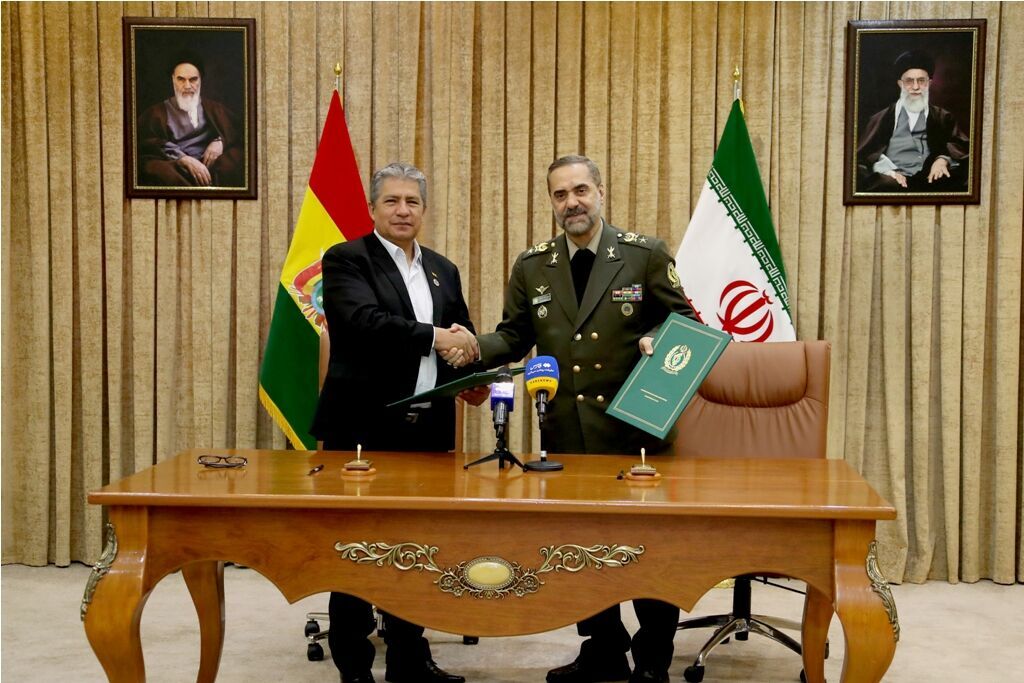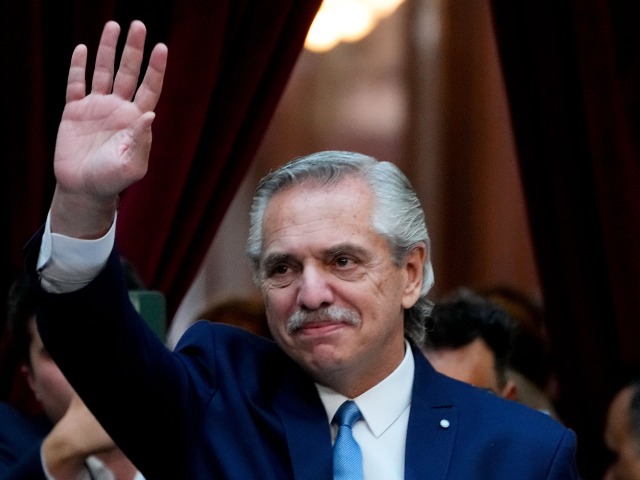Bolivian Defense Minister Edmundo Novillo disclosed on Tuesday details pertaining to the cooperation agreement his country signed with Iran last week amid national security concerns from Argentina regarding growing Iranian influence in the region.
The agreement, according to Novillo’s information, allows Bolivia to acquire Iranian drones, boats, and technology to strengthen “territorial and border control” and fight against drug trafficking.
The Bolivian (🇴) Minister of Defense, Edmundo Novillo, has signed a Memorandum of Understanding (MoU) for the purchase of drones from Iran (🇷) during his visit to Tehran.
The pair signed a number of cooperative agreements regarding military assistance in Bolivia. pic.twitter.com/P7X8C6JuiJ
— SA Defensa (@SA_Defensa) July 26, 2023
Novillo traveled to Tehran last week to meet with his Iranian counterpart Mohammad Reza Ashtiani, representing the socialist government of President Luis Arce. Both defense ministers signed a memorandum of understanding in defense and security. Neither side publicly offered details on what the agreements actually entailed at the time.
Ashtiani stated that relationships between Iran and “like-minded” Latin American countries are an “example of independent countries.” Novillo asserted Iran “is a model for Bolivia to achieve the freedom of nations.”

Iran’s Defense Minister Brigadier General Mohammad Reza Ashtiani and his Bolivian counterpart Edmundo Novillo signed the defense and security MoU on July 20, 2023. (Islamic Republic News Agency)
The agreement signed between Bolivia and Iran elicited concerns from both Argentina’s socialist government and the opposition over the potential implications of growing Iranian influence. The Jewish community in the country, in particular, voiced alarm, as they were the targets of the 1994 bombing of the Argentine-Israeli Mutual Association (AMIA), a deadly terrorist attack in which Iranian officials have been implicated for decades. The AMIA bombing killed 85 people and was the deadliest attack in the history of the Western Hemisphere prior to September 11, 2001.
Argentina, through its Foreign Ministry, formally requested information from Bolivia about the “scope of the discussion and possible agreements reached” during Novillo’s visit to Tehran.

Argentine President Alberto Fernandez waves as he arrives to the opening session of Congress in Buenos Aires, Argentina, Wednesday, March 1, 2023. (Natacha Pisarenko/AP)
Lawmaker Alberto Asseff protested the agreement as a means for Bolivia to arm itself and receive drones “like the ones it [Iran] delivered to Russia in the war against Ukraine” (Iran denies having provided such drones, though Ukrainian officials claim to have evidence of their presence on the battlefield). Asseff wondered aloud what conflict Bolivia expects to get involved in that would require Iranian drones.
The President of the Delegation of Israelite Associations of Argentina (DAIA) Jorge Knoblovits condemned the agreement between Bolivia and Iran in an interview with Argentina’s Radio Mitre on Wednesday, asserting that the control of Bolivia’s borders with Iranian drones represents “a platform for acts of espionage.”
“Nothing that Iran contributes will be for good causes, but on the contrary, it is like having the enemy next door,” Knoblovits said. “There is no other reading than that they are acts of espionage or preparation of the ground for other acts of terrorism.”
“In these agreements there is always an unwritten letter, here there must be other things, I don’t know if it is a surrender of economic sovereignty, of natural resources or a platform for espionage,” he continued.
The agreement also drew criticisms from Bolivia’s opposition politicians.
“The defense minister must explain the agreement and why it has been signed with a country that has complications on the international stage when Bolivia is supposed to be pacifist according to its constitution,” Bolivian opposition lawmaker Gustavo Aliaga told the Associated Press on Tuesday.
Novillo reacted to Argentina’s concerns in a press conference on Tuesday, describing them as an “exaggeration” and a “political show” orchestrated by the “extreme right,” attributing the Argentine reaction to the upcoming presidential and legislative primary elections scheduled for August.
The defense minister claimed that his visit to Iran was to discuss science and technology and was “not a threat, nor does it put at risk” anyone in the region. He claimed that cooperation with Iran in the defense sector would not lead to “hostile attacks” planned in Bolivia.
“Those who have wanted to mention that my trip to Iran could mean a risk, a threat to peace, to the region, I believe that this is a fantasy fallacy and without limits or with purely political interests,” Novillo said, ruling out that his trip had been to make “any warlike gesture.”
Novillo then disclosed details pertaining to the agreement he signed in Tehran last week. The deal allegedly allowed for the acquisition of drones and boats to “strengthen territorial and border control, combat drug trafficking and smuggling.” The agreement also covered the implementation of Iranian technology in areas such as cyber protection, nanotechnology, and geomatics.
The Bolivian defense minister explained that the possibility of acquiring Iranian drones was discussed during his visit to Tehran after Iranian officials showed him mock-up drones suitable for border control in mountain areas.
“Iran showed us the development of drones because we told them that we have mountainous and high geography. In that understanding, they answered that this technology could satisfy the requirement,” Novillo stated.
Novillo explained that the possibility of acquiring Iranian-made boats arose from the Bolivian government’s need for patrol vessels to fight drug trafficking and smuggling across the nation’s rivers.
Bolivia is a landlocked country, a result of losing its only coast to Chile during a war 140 years ago. Since then, the South American nation has unsuccessfully attempted to force Chile to negotiate maritime access to Bolivia through international pressure.
Novillo disclosed that the agreement also opens up the possibility of contracting Iranian technicians for the maintenance of Bolivia’s helicopters and airplanes. Novillo asserted that Iranian expertise in that field could be very useful for Bolivia.
Lastly, Novillo expressed the Bolivian government’s interest in having cybersecurity systems to prevent data breaching or hacking in its institutions, including the Bolivian Armed Forces.
“It is another point that we can work on together,” Novillo said.
Iran’s new agreement with Bolivia marks the continued growth of Iranian influence in Latin America and comes one month after Iranian President Ebrahim Raisi’s first tour of the region, in which he visited Iran’s three allied authoritarian regimes in Latin America: Venezuela, Cuba, and Nicaragua.
Raisi’s trip saw Iran sign new agreements with its allied leftist regimes, including for the establishment of a new technology office in Venezuela, new science and technology agreements with Nicaragua, and vows to fight against “Yankee imperialism” with Cuba.
Christian K. Caruzo is a Venezuelan writer and documents life under socialism. You can follow him on Twitter here.


